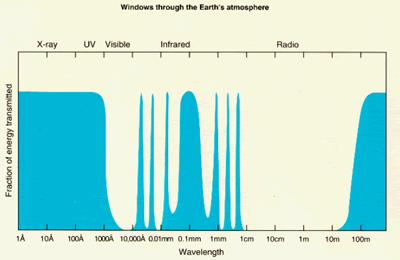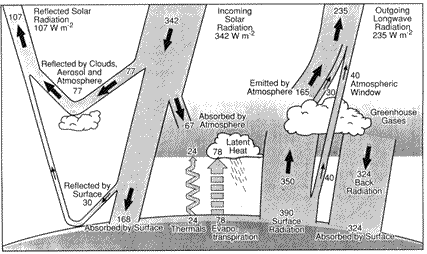
|
Absorption is the process by which "incident radiant energy is retained by a substance." In this case, the substance is the atmosphere. When the atmosphere absorbs energy, the result is an irreversible transformation of radiation into another form of energy. This energy is transformed according to the nature of the medium doing the absorbing. The absorbing medium can also do much more. The medium will only absorb a portion of the total energy. The other energy will either be reflected, refracted, or scattered. The energy absorbed can also be transmitted back into other parts of the atmosphere, as will be discussed in the transmission page of this site. The atmosphere, due to the many different gases and particles contained therein, absorbs and transmits many different wavelengths of electromagnetic radiation. The wavelengths that pass through the atmosphere unabsorbed constitute the "atmospheric windows." The atmospheric windows can be seen in the graphic below, taken from The Columbus Optical SETI Observatory, which shows the lines of transmission through the atmosphere. The valleys, like at the left end of the scale for visible light, are the "windows" where there is very little attenuating of the radiation by the medium it passes through.
Absorption is mainly caused by three different atmospheric gases. Contrary to popular belief, water vapor causes the most absorption, followed by carbon dioxide and then ozone. In the picture below, one can see how much of the total incoming radiation the atmosphere typically absorbs.
Atmospheric absorption of electromagnetic radiation helps the earth in two main ways. First, absorption helps people by preventing high-energy radiation from reaching the surface which limits our exposure to harmful radiation. The atmosphere absorbs most of the radiation from the ultraviolet region through the X-ray region. The second way in which absorption helps the earth is as a heat source for it. If one were to take a vertical cross section of the entire atmosphere, one would note that the temperature generally increases with height. This increase in temperature is caused by an increase in absorption of electromagnetic radiation with height due to higher concentrations of high-energy wavelength absorbing gases present at higher atmospheric levels. |





